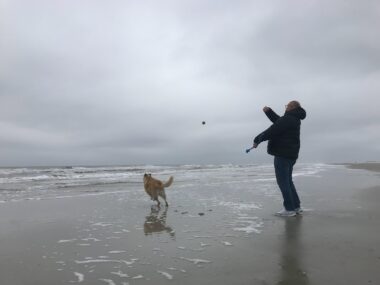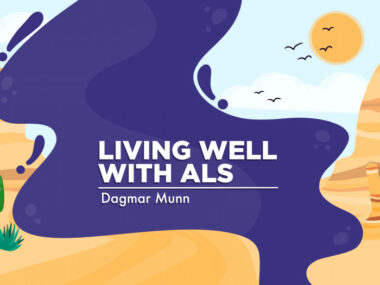How ALS taught me to feel emotions more deeply
I'd always faced difficulties with stoicism — until my late husband's diagnosis
Written by |

After the loss of my beloved dog Rudder when he was 12 years old, a close friend observed with concern that she hadn’t seen me cry. It was true, I hadn’t shed any tears publicly, and even privately I sat with my grief quietly and alone. Rudder had gotten me and my late husband, Jeff, through Jeff’s ALS diagnosis and disease progression, and was my most loyal companion for six more months after Jeff died in May 2020. Losing Jeff and Rudder in the same year was wrenching.
Each of us develops our own means of coping with heartbreak. From a young age, my go-to method for dealing with difficulty had always been stoicism. I felt things deeply, but processed them privately, which had the unfortunate effect of leading people to think I was strong when I was anything but. And it’s true, I almost never cried. This wasn’t due to a lack of feeling, but more the sense that tears wouldn’t help, so I suppressed them. That strategy worked for most of my life until Jeff began developing symptoms that doctors hinted could be caused by ALS.
Even before Jeff’s diagnosis was confirmed, I sensed that my standard coping mechanisms would be no match for ALS. I had a feeling that, should the worst news come, I would face feelings for which I was woefully unprepared. In fairness, I don’t think any of us — patient, caregiver, loved one — who have been in the room for an ALS diagnosis can be prepared. Even expecting them, hearing the words “You have ALS” being delivered to Jeff felt like a punch in the stomach.
I remember wanting to be strong for Jeff on that day and those that followed, but I felt anguish instead. Jeff, a retired Bureau of Alcohol, Tobacco, Firearms and Explosives agent who was always the one to lead in a crisis, decreed that day that we were going for ice cream, and we did. Once home, he went to the front porch to make some phone calls. I went to the backyard alone, where I was overcome with grief. I paced aimlessly around the yard, sobbing. I remember feeling somehow disconnected from my body. It was the first time, but not the last, that I had that reaction.
I’ve written here before how Jeff and I processed his ALS diagnosis both together and privately. Together, we were often strong in those early days and beyond. But alone, I settled into a daily routine of walking Rudder in the woods where I could cry and not be seen or heard.
I remember feeling utter exhaustion after those tears. They didn’t make me feel better, just weary. But as the weeks passed after his diagnosis, Jeff and I both found our bearings, and began to make decisions and plans. We didn’t have any idea whether his progression would be fast or slow, whether we’d have six months or six years, and we began to understand that time was a precious commodity to be spent in the company of people he loved and who loved him.

Jeff Sarnacki and his dog Rudder play ball on the beach in February 2019, three months after Jeff’s ALS diagnosis. (Photo by Juliet Taylor)
ALS brought new emotions regularly, and all of them required my presence as Jeff’s wife and caregiver. Stoicism no longer worked. My days were filled with feelings that demanded attention: love for Jeff, anger at ALS, fears for his health, gratitude for his life and for the time we still had. I often felt all of those things in one day. And along the way, there were plenty of tears.
When Jeff died, I remember that early grief came in waves and bursts. I’d be driving and feeling OK, and then I’d have to suddenly pull over and sob. It was so different from the way I’d experienced emotions before ALS, and I remember observing how little control I had over grief and sadness.
ALS put me in greater touch with a wide range of feelings, many of which were unwelcome at the time, but in retrospect, all of them needed to be felt. Stifling them would have been unhelpful and inauthentic for me as Jeff’s wife, and unhealthy for me as an individual.
I’d no longer call myself stoic, and that’s an unexpected gift. I’ve discovered over the five years since Jeff’s death that I’m now in touch with a wider range of emotions, from tears of sadness to tears for beautiful things as well. I find myself deeply moved when listening to live music, or remembering a wonderful and loyal dog. These kinds of tears don’t make me weary, but uplifted.
All of us face our emotions differently, and ALS changed the way that I feel mine. Caregiving and loving in the face of terminal illness was devastating, but I’m grateful to have experienced all the related feelings so deeply — then, now, and going forward.
Note: ALS News Today is strictly a news and information website about the disease. It does not provide medical advice, diagnosis, or treatment. This content is not intended to be a substitute for professional medical advice, diagnosis, or treatment. Always seek the advice of your physician or other qualified health provider with any questions you may have regarding a medical condition. Never disregard professional medical advice or delay in seeking it because of something you have read on this website. The opinions expressed in this column are not those of ALS News Today or its parent company, Bionews, and are intended to spark discussion about issues pertaining to ALS.







Jana Pearson
Thank for posting this most brave expression of your tears and how you have and now ARE handling your grief. God bless you!
My Mom died 11 mos after her ALS diagnosis (which took 2+ yrs to be known, even after trips
To Mayo Clinic and two other providers in CA and Okla City where she resided ). I retired early so that I could
Travel back and forth from Fresno, CA to Okla City, OK to help
Care for her and enable her to stay home with caregivers vs be in care facility. It was a blessing to do that. I will
Never regret that time. I too found solace in walking around
Her lovely neighborhood. Often crying my eyes out as I didn’t want to do it in her presence. I wish I’d allowed myself to cry WITH my sisters and with Mom. I pray for more research and tx and cure for this horrible disease. And also that none of our family have inherited the ALS gene. We chose not to be tested.
Mille Boc
My husband was officially diagnosed on October 4th 2024 , he started showing signs in February of 24 . I have taken care of him everyday. We have no children. So I tell myself that I can do this every morning when I go to wake him up and get him out of bed , dress him feed him and bath him . It exhausting but I don't have a choice.